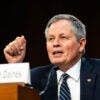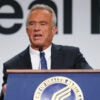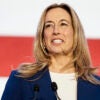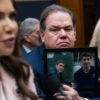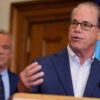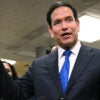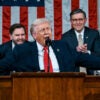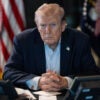Just before joining climate change activist and former Vice President Al Gore for a press conference in New York City, seven state-level attorneys general huddled with a representative of the Union of Concerned Scientists. The political activist, Peter Frumhoff, called for them and other elected officials to move decisively against major corporations and institutions for “denying” climate change.
“Americans should be outraged by this abuse of governmental powers by the chief law enforcement officials of these states.”—@HvonSpakovsky
The seeds of that call to action in March were planted four years earlier across the country, when Frumhoff and other environmental activists gathered with trial lawyers and academics to plot strategy in San Diego.
The Daily Signal found this and other revealing bits of information among material produced in response to a Freedom of Information Act lawsuit filed against Virginia’s George Mason University, home to six academics who urged the Obama administration to prosecute individuals and organizations for not agreeing that man has caused climate change.
The detail is important because Rep. Lamar Smith, R-Texas, chairman of the House Committee on Science, Space, and Technology, demanded that 17 state attorneys general who call themselves “AGs United for Clean Energy” provide documents on interactions among their offices—and with various environmental organizations.
Such details obtained through the lawsuit “reveal the incestuous relationship between climate change activists and partisan state attorneys general,” Hans von Spakovsky, a senior legal fellow at The Heritage Foundation, told The Daily Signal. He added:
They are subverting our democratic system by using the courts to silence the opposition to their economically costly, unneeded policy solutions for an unproven scientific theory. Americans should be outraged by this abuse of governmental powers by the chief law enforcement officials of these states.

Peter Frumhoff of the Union of Concerned Scientists helped organize a strategy meeting in 2012 that led to his briefing of state attorneys general last March. (Photo: Peter Frumhoff Twitter)
Smith’s letters to the attorneys general refer to the meeting held in June 2012 in California and billed as a Workshop on Climate Accountability, Public Opinion, and Legal Strategies.
A total of 23 environmental activists, trial lawyers, and academics came together in the seaside San Diego neighborhood of La Jolla to devise a “strategy to fight industry in the courts” over climate change, the House committee chairman says in the letters.
Another goal of the meeting was to find ways to confront what attendees described as a “network of public relations firms and nonprofit front groups that have been actively sowing disinformation about global warming for years.”
According to a summary of the La Jolla gathering, the activists came up with the idea of using the federal law known as RICO—the Racketeer Influenced and Corrupt Organizations Act—against the fossil fuel industry.
Congress passed RICO in 1978 for the purpose of prosecuting mob crimes. In recent months, though, climate change activists have sought to use it against organizations, corporations, and scientists that aren’t convinced human activity is responsible for catastrophic climate change.
Early on in the workshop, Richard Ayres, a Washington lawyer who is a co-founder and trustee of the Natural Resources Defense Council, first mentioned the RICO tactic as a possible weapon against fossil fuel.
Ayres’ environmental organization is a well-endowed, tax-exempt advocacy group headquartered in New York City. Public records show it had financial assets of $268.1 million as of 2013.
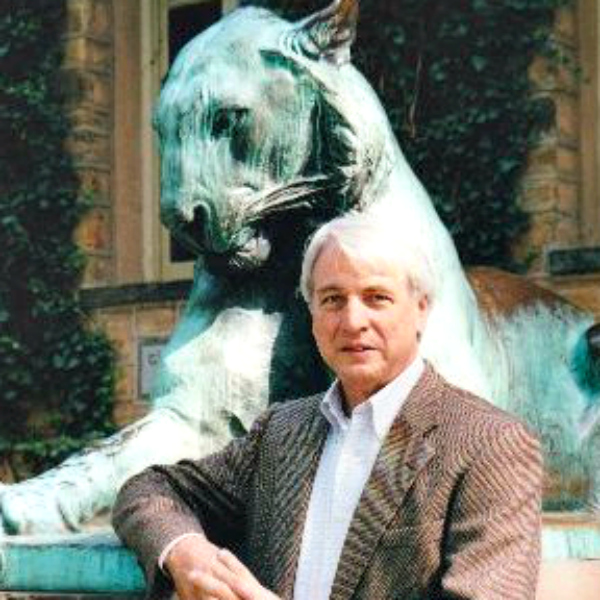
Richard Ayres, co-founder and trustee of the Natural Resources Defense Council. (Photo: Richard Ayres Twitter)
Reached by telephone Tuesday by The Daily Signal, Ayres said the meeting “was a long time ago” and declined comment.
Other workshop attendees included Frumhoff, director of science and policy for the Union of Concerned Scientists, who met with the attorneys general in New York in March, and Matthew Pawa, an environmental activist and trial lawyer who founded the Global Warming Legal Action project.
The Big Tobacco Analogy
A 36-page document, “Establishing Accountability for Climate Change Damages,” outlines the business of the workshop held June 14 and 15, 2012, in La Jolla.
Those attending took inspiration from successful litigation efforts directed against the tobacco industry in the 1990s. But, according to the summary, they acknowledged that a similar legal strategy against fossil fuel companies “would present a number of different obstacles and opportunities.”
By opportunities, they meant litigation. The summary notes “widespread agreement among workshop participants” that some form of “cancer analog” for global warming, such as rising sea levels, must be established.
Naomi Oreskes, a professor of the history of science at Harvard University who played a key role in organizing the workshop, is quoted in the workshop summary as saying: “When I talk to my students I always say tobacco causes lung cancer, esophageal cancer, mouth cancer. … My question is: What is the ‘cancer’ of climate change that we need to focus on?”
“The oil industry uses a lot of the same individuals and organizations as the tobacco industry” in “manipulation of science to defraud the public.”–@ProfGlantz
The documents on tobacco litigation are collected in a searchable, online repository called the Legacy Tobacco Documents Library, the summary notes. Workshop attendee Stanton Glantz, a professor of medicine and director of the Center for Tobacco Control Research and Education at the University of California, San Francisco, runs the project.
In response to an email from The Daily Signal requesting comment, Glantz said he was “struck by the parallels” between the public relations tactics of the oil industry and the tobacco companies. He said:
The pattern of quietly financing public relations efforts and small ‘independent’ groups of scientists in order to confuse the public about the overwhelming scientific evidence linking human activities—including energy consumption using Exxon Mobil—while privately using high-quality, accurate science that recognizes global warming to make internal business decisions is precisely the behavior pattern that got the tobacco companies into so much trouble for defrauding the public. The oil industry also uses a lot of the same individuals and organizations as the tobacco industry. Such manipulation of science to defraud the public was a central element of the RICO case [against the tobacco industry].
Contrary to what some environmentalists tell the public, however, skeptics of man-made climate change argue that the analogy between tobacco use and climate change does not hold.
Theories linking human activity with global warming, they say, are in dispute.
In fact, hundreds of climate scientists from across the globe have contributed to reports of the Nongovernmental International Panel on Climate Change (NIPCC), which calls itself an “international panel of nongovernment scientists and scholars, who have come together to present a comprehensive, authoritative, and realistic assessment of the science and economics of global warming.”
The Nongovernmental International Panel on Climate Change was set up as a rejoinder to the United Nations Intergovernmental Panel on Climate Change, also known as the IPCC, which has produced reports promoting the idea that human activity drives catastrophic climate change.
In contrast, the nongovernmental group of scientists finds no consensus, no basis for predictions of future climate conditions, and no case for forcing a transition away from fossil fuels.
The organization’s reports demonstrate that an increasing number of scientists say natural variability, not human activity, is the primary driver of warming and cooling trends. In 2008, it joined with the Heartland Institute, a free-market think tank based in Illinois, to produce a report entitled “Nature, Not Human Activity, Rules the Climate.”
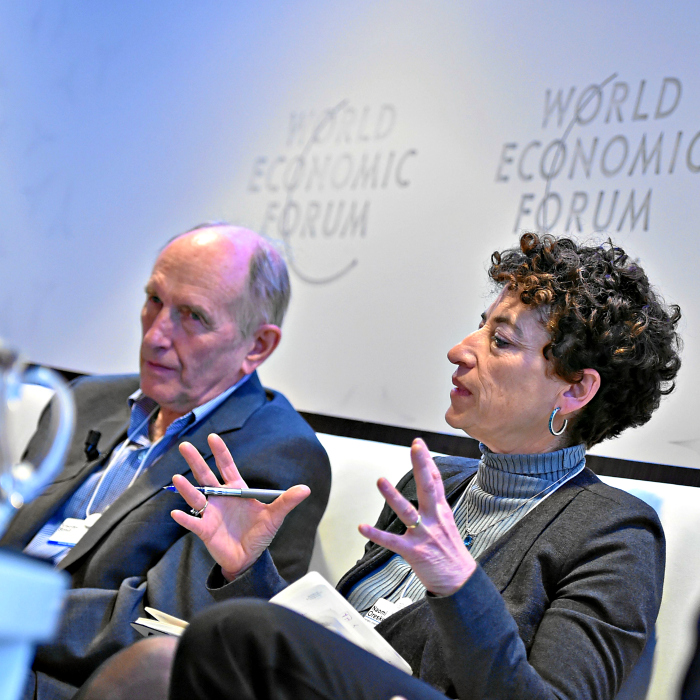
Naomi Oreskes, a Harvard University professor who helped organize the 2012 gathering, speaks at a World Economic Forum event in January 2015 in Switzerland. (Photo: Michael Buholzer/Swiss-Image/Newscom)
‘It’s All About the Money’
Four years after the meeting in La Jolla, Frumhoff gave a presentation in New York to the seven state attorneys general on the “imperative of taking action now on climate change” just before they held their March 29 press conference with Gore. That same morning, Pawa’s law office briefed the attorneys general on climate change litigation.
Chris Horner, a lawyer and senior fellow with the Competitive Enterprise Institute, a libertarian and free-market think tank based in Washington, late last year filed the Freedom of Information Act lawsuit against George Mason University that produced email records highlighting coordination among environmental activists and the 17 state attorneys general.
As reported previously by The Daily Signal, 20 academics from across the country who specialize in climate change, including the six from George Mason University, signed a letter dated Sept. 1, 2015, asking the Obama administration to consider pursuing a federal racketeering investigation against “the fossil fuel industry and their supporters.”
They addressed the letter to President Barack Obama, Attorney General Loretta Lynch, and John Holdren, director of the Office of Science and Technology Policy.
The “RICO 20,” as the academics came to be known, argued that “corporations and other organizations … knowingly deceived the American people about the risks of climate change, as a means to forestall America’s response to climate change.”
The writers credited Sen. Sheldon Whitehouse, D-R.I., for proposing use of the racketeering law against such climate skeptics. But in reality, the idea originated with the La Jolla workshop more than three years earlier.
“The Union of Concerned Scientists has a long history of left-wing activism.”—@Ron_Arnold
The Union of Concerned Scientists played a critical role in organizing the 2012 meeting, notes Ron Arnold, executive vice president of the Center for the Defense of Free Enterprise, a conservative educational group.
“The Union of Concerned Scientists has a long history of left-wing activism,” Arnold said in an interview with The Daily Signal. “It was informally founded but not incorporated in 1969 as an anti-Vietnam War protest group by students and faculty members at the Massachusetts Institute of Technology.”
The organization, which incorporated in 1973, had assets of $46.5 million as of 2014.
The 2012 meeting on climate change was simply an extension of the scientists’ involvement in “numerous far-left causes,” Arnold said:
When you take a hard look at this workshop, you will find it really has nothing to do with global warming. Instead, it’s all about the money, it’s all about big legal settlements.
A Threat to Free Speech
The coalition called AGs United for Clean Energy, also dubbed the “Green 20,” made its official debut during the press conference with Gore. All the original members are Democrats except Claude E. Walker of the Virgin Islands, an independent.
The stated objective of the coalition of attorneys general is to “defend climate change progress made under President Obama.”
To this end, some of the prosecutors subpoenaed documents, communications, and research aimed at acquiring the work material of more than 100 academic institutions, nonprofit organizations, and individual scientists, according to Smith’s House committee.
In his correspondence with the state officials, the Texas congressman expressed concern that their tactics undermined free speech and stifled meaningful scientific debate at the expense of the public interest, which, he noted, government attorneys should work to uphold.
Smith also sent letters to eight environmental activist groups, including the Union of Concerned Scientists, asking for “documents related to the groups’ coordinated efforts to deprive companies, nonprofit organizations, scientists, and scholars of their First Amendment rights and their ability to fund and conduct scientific research free from intimidation and threats of prosecution.”
New York Attorney General Eric Schneiderman and Massachusetts Attorney General Maura Healey continue to press ahead with investigations of Exxon Mobil Corp. But not everyone else in the coalition seems to be on board with the tactics congressional critics view as a violation of free speech.
In fact, not every prosecutor who initially identified himself or herself with the coalition in March appears to be part of it today. The Energy and Environment Legal Institute, a Washington-based nonprofit also known as E&E Legal, recently released a batch of emails suggesting the “Green 20” was beginning to fray around the edges.
Delaware’s attorney general, Matthew Denn, has withdrawn from the coalition. The attorneys general of Virginia, Vermont, and Iowa—Mark Herring, William Sorrell, and Tom Miller—all expressed reservations in one form or another.
Walker, the Virgin Islands attorney general, decided to withdraw his subpoena against the Competitive Enterprise Institute, the libertarian think tank in Washington.
Walker had asked for CEI to turn over its work on climate change over the past decade. In turn, CEI asked the District of Columbia Superior Court to fine Walker for violating its First Amendment rights under the District’s law against bullying lawsuits, as well as for attorneys’ fees and other sanctions.
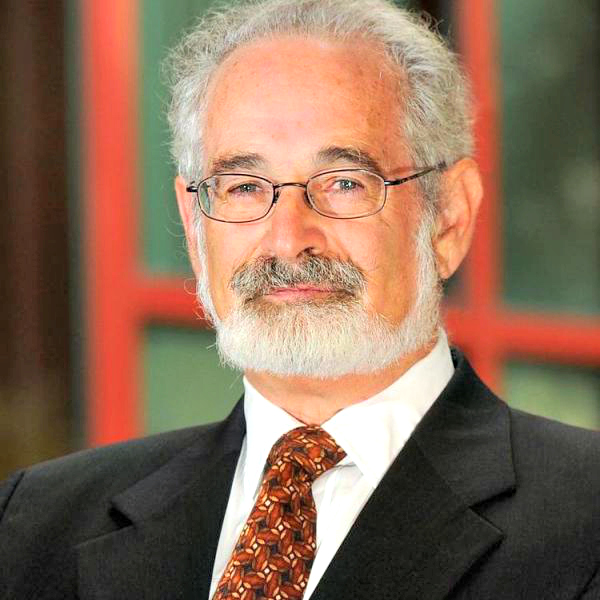
Stanton Glantz, director of the Center for Tobacco Control Research and Education. (Photo: University of California, San Francisco)
Resisting Congressional Subpoenas
E&E Legal describes itself as devoted to strategic litigation, policy research, and public education. Chaim Mandelbaum, a Virginia lawyer representing the organization, told The Daily Signal that he suspects that the negative media attention on the relationship between the state attorneys general and green pressure groups prompted some of the elected officials to rethink their position.
Continued congressional scrutiny has backed the “Green 20” into a defensive position, Mandelbaum said.
Smith issued subpoenas to New York’s Schneiderman, Massachusetts’ Healey, and the eight environmental groups: the Union of Concerned Scientists, the Climate Accountability Institute, Rockefeller Family Fund, the Rockefeller Brothers Fund, Pawa Law Group, Greenpeace, the Climate Reality Project, and 350.org.
So far, all have resisted the congressional subpoenas.
“From the moment man-made global warming was elevated to a problem requiring ‘urgent’ action, the political class has used the issue to increase its power and wealth.” —@NationalCenter’s Bonner Cohen
E&E Legal is pursuing Freedom of Information Act lawsuits against Rhode Island Attorney General Peter Kilmartin as well as Schneiderman over their use of a “secrecy pact” describing how they intended to silence climate change skeptics and conceal their actions from the public.
In related developments, E&E Legal joined several New York citizens groups in an effort to shake loose records detailing any coordination between the New York attorney general and Tom Steyer, a billionaire environmental activist and major donor to the Democratic Party.
Most recently, E&E Legal filed an open records suit against Herring, Virginia’s attorney general, asking for “portions of correspondence with and about ringleader New York AG Eric Schneiderman’s office.” The suit also seeks information from Herring about “outside advisers.”
A federal judge in Texas ordered Healey to appear Dec. 13 in a Dallas court to answer questions about her investigation of Exxon Mobil. But the day before, U.S. District Judge Ed Kinkeade canceled his order, which Healey had vowed to resist.
Kinkeade instead gave Healey and lawyers for Exxon Mobil until Jan. 4 to submit briefs on why or why not the deposition should take place in Texas, the Boston Herald reported.
>>> Democrat AGs, Green Groups Defy Subpoenas on Coordinated Climate Efforts
“We see a substantial amount of collusion going on,” E&E Legal’s Mandelbaum told The Daily Signal, citing meetings between the state attorneys general and the Union of Concerned Scientists prior to the press conference with Gore.
Mandelbaum also said calendar entries indicate Pawa, the trial lawyer who founded Global Warming Legal Action, met with the attorneys general and gave them information suggesting Exxon Mobil has concealed facts about climate change. Mandelbaum said:
There’s a lot of evidence showing these outside groups are presenting the [attorneys general] with information that says Exxon Mobil is hiding information, when there is no evidence that this is true. It’s clear these outside [environmental] groups have been driving this agenda and trying to get the attorneys general to take some kind of action. We are talking about extremely open-ended investigations that are political and not really legal.
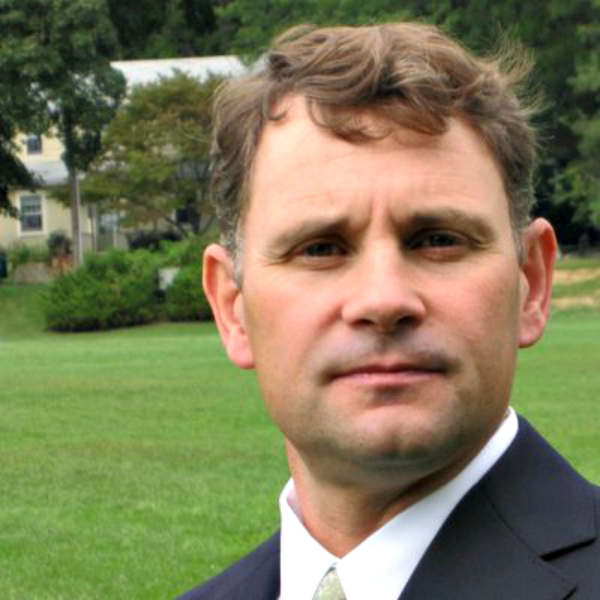
Matthew Pawa, a trial lawyer who founded Global Warming Legal Action, met with state attorneys general regarding potential action against corporations, documents show. (Photo: Matthew Pawa Twitter)
‘Alarmists Have Never Succeeded’
Bonner Cohen, a senior fellow at the National Center for Public Policy Research, told The Daily Signal that he sees vast differences between what occurred with the tobacco industry years ago and the scientific realities of climate change—what activists used to call global warming.
“The 1963 surgeon general’s report linking cigarette smoking to a higher risk of lung cancer was a scientific finding, plain and simple, one which has withstood the test of time,” Cohen said, adding:
Unlike ‘climate change,’ originally labeled ‘global warming,’ the surgeon general’s report was never a part of a larger political agenda. From the moment man-made global warming was elevated to a problem requiring ‘urgent’ action at a well-orchestrated Senate hearing in 1988, the political class in the U.S. and elsewhere has used the issue to increase its power and wealth.
Yet despite numerous international conferences, congressional hearings, untold billions of taxpayer dollars spent on climate ‘research,’ the blatant manipulation of data, and a vast PR campaign, alarmists have never succeeded in establishing a cause-and-effect relationship between man-made greenhouse gases and a warming of the planet.
Cohen continued:
Such a relationship was established—and never seriously disputed—regarding the link between cigarette smoking and lung cancer. Alarmists have tacitly acknowledged this by claiming that the ‘science is settled on climate change.’ It isn’t, and they know it, but they want to snuff out all debate on the subject so we can get on to the important business of eliminating fossil fuels and replacing them with renewable energy. The ultimate goal is to have a self-appointed mandarin class of transnational bureaucrats dictate how energy is to be rationed globally. This is a far cry from warning people about the dangers of smoking.
The Daily Signal repeatedly sought comment from Oreskes by phone and email, but she has not responded.
The summary of the 2012 workshop proceedings makes it clear she was among key organizers. For example, Page 2 says:
The workshop was conceived by Naomi Oreskes of the University of California, San Diego [since removed to Harvard University], Peter C. Frumhoff and Angela Ledford Anderson of the Union of Concerned Scientists, Richard Heede of the Climate Accountability Institute, and Lewis M. Branscomb of the John F. Kennedy School of Government at Harvard University and the Scripps Institution of Oceanography.
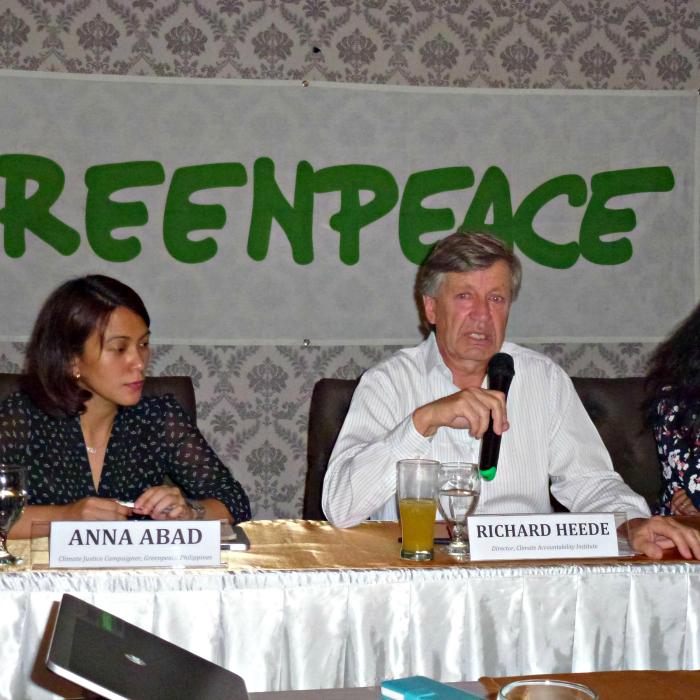
Richard Heede, co-founder and director of the Climate Accountability Institute, briefs reporters in Manila on his research on carbon dioxide emissions on May 13, 2015. (Photo: Kyodo/Newscom)
Oreskes also is a co-founder of the Climate Accountability Institute, where she and Frumhoff serve on an advisory board. The tax-exempt organization, incorporated in 2011 in Snowmass, Colorado, reported assets of $31,579 as of 2014.
The Daily Signal sought comment from spokesmen for the Union of Concerned Scientists by phone and email, but the organization has not responded. Heede, a co-founder and director of the Climate Accountability Institute, was reached briefly by telephone but declined to comment.
Branscomb, professor emeritus of public policy and corporate management at Harvard and research associate at Scripps Institution of Oceanography, declined comment. Neither Frumhoff nor Anderson, director of the climate and energy program at the Union of Concerned Scientists, could be reached for comment.
In June, Oreskes delivered testimony before a panel of the Congressional Democratic Progressive Caucus, a group of the most liberal lawmakers in Congress, underscoring the Harvard professor’s leading role in the campaign of the attorneys general targeting skeptics of man-made climate change.
Arnold, the Center for Defense of Freedom vice president, said:
The testimony from Oreskes revealed that Schneiderman had been conducting his inquisition against Exxon Mobil long before reports surfaced alleging the company hid information related to global warming. Ironically, Exxon Mobil sent the [New York] attorney general mountains of material and showed that all its science had been published in peer review journals, thus had been available to the public all the time. That didn’t stop Schneiderman, who was obviously operating a political crusade, not a criminal investigation.
Donors behind the 2012 workshop on climate change accountability also were acknowledged on Page 2 of the summary: “This workshop was made possible by the V. Kann Rasmussen Foundation, the Mertz Gilmore Foundation, the Grantham Foundation for the Protection of the Environment, and the Martin Johnson House at the Scripps Institution of Oceanography.”
The Johnson House, where the activists gathered, is an oceanfront cottage used by the Scripps Institution of Oceanography, a department of University of California, San Diego.
The assets propelling the three named foundations amount to more than half a billion dollars—$608.5 million—according to tax documents for 2013: $89.3 million for the Rasmussen Foundation; $125.1 million for the Gilmore Foundation; and $394.1 million for the Grantham Foundation.
“Combined with the assets behind the many funders of all the workshop’s participants, the financial clout represented here is many billions of influential dollars,” Arnold said.
‘Your Source Has It Wrong’
Arnold questioned the motivations of the workshop organizers, in particular Glantz, co-author of the 2012 book “Bad Acts: The Racketeering Case Against the Tobacco Industry,” and Oreskes, whose 2011 book “Merchants of Doubt” he called a “fossil fuel smear.” Arnold said:
[Oreskes] knew of the huge payoff from the tobacco case settlement [in 1998] that gave University of California professor Stanton Glantz his own institute within the university, the Center for Tobacco Control Research and Education. Glantz was a participant in the La Jolla meeting, [and] talked about his involvement in the tobacco cases.
Subsequently, Oreskes was a participant in New York Attorney General Schneiderman’s RICO campaign where she informed the coalition members of the content of her book and her book’s research into the tobacco cases.
The Daily Signal specified Arnold’s remarks about her in seeking comment from Oreske, but the Harvard professor has not responded.
Glantz did offer a rejoinder to Arnold, saying in an email to The Daily Signal that he didn’t have “formal involvement in the tobacco cases” and was not a witness. He said he did “from time to time provide information and answer questions from some of the lawyers.”
“So, your source has it wrong,” he told The Daily Signal, “which is not surprising since ‘climate skeptics’ either don’t understand or ignore the science on global warming.”
Ken McIntyre contributed to this report.

